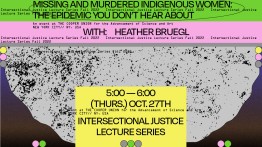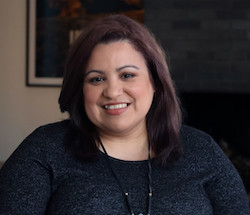Missing and Murdered Indigenous Women: The Epidemic You Don't Hear About
Thursday, October 27, 2022, 5 - 6pm

As part of a series on Intersectional Justice, Heather Bruegl will discuss an epidemic that no one is talking about outside of Indian Country: an epidemic of missing and murdered Indigenous women. With numbers so high that they are unreported, how do we deal with it all? Why aren't there concrete statistics? Why do the crimes go unreported? What has the FBI done to help with this epidemic? What does “Missing White Woman Syndrome” have to do with this? Let's talk some history and try to find out why this is an issue and what we can do in and out of Indian Country to make sure that our sisters, mothers, daughters, wives, girlfriends, women, don't become a statistic.
Registration for this Zoom event is required. Click here to register. 
In the Munsee language, Heather Bruegl’s name is Kiishookunkwe, meaning sunflower in full bloom. Heather is a citizen of the Oneida Nation of Wisconsin and a first line descendent Stockbridge Munsee. She is a graduate of Madonna University in Michigan and holds a Master of Arts in U.S. History. Heather is the former director of education at Forge Project and travels frequently to present on Native American history, including policy and activism.
This series is co-organized by the Office of Student Affairs and Nada Ayad, Associate Dean of HSS, as a continuation of a reading and discussion series for first-year students that was held as part of the Fall 2020 new student orientation. In the spirit of The Cooper Union mission, the Black Student Union and the Cooper Climate Coalition, along with several other Cooper students and faculty, were deeply involved in the articulation of the program as well as in contributing to the reading list and suggesting speakers.




